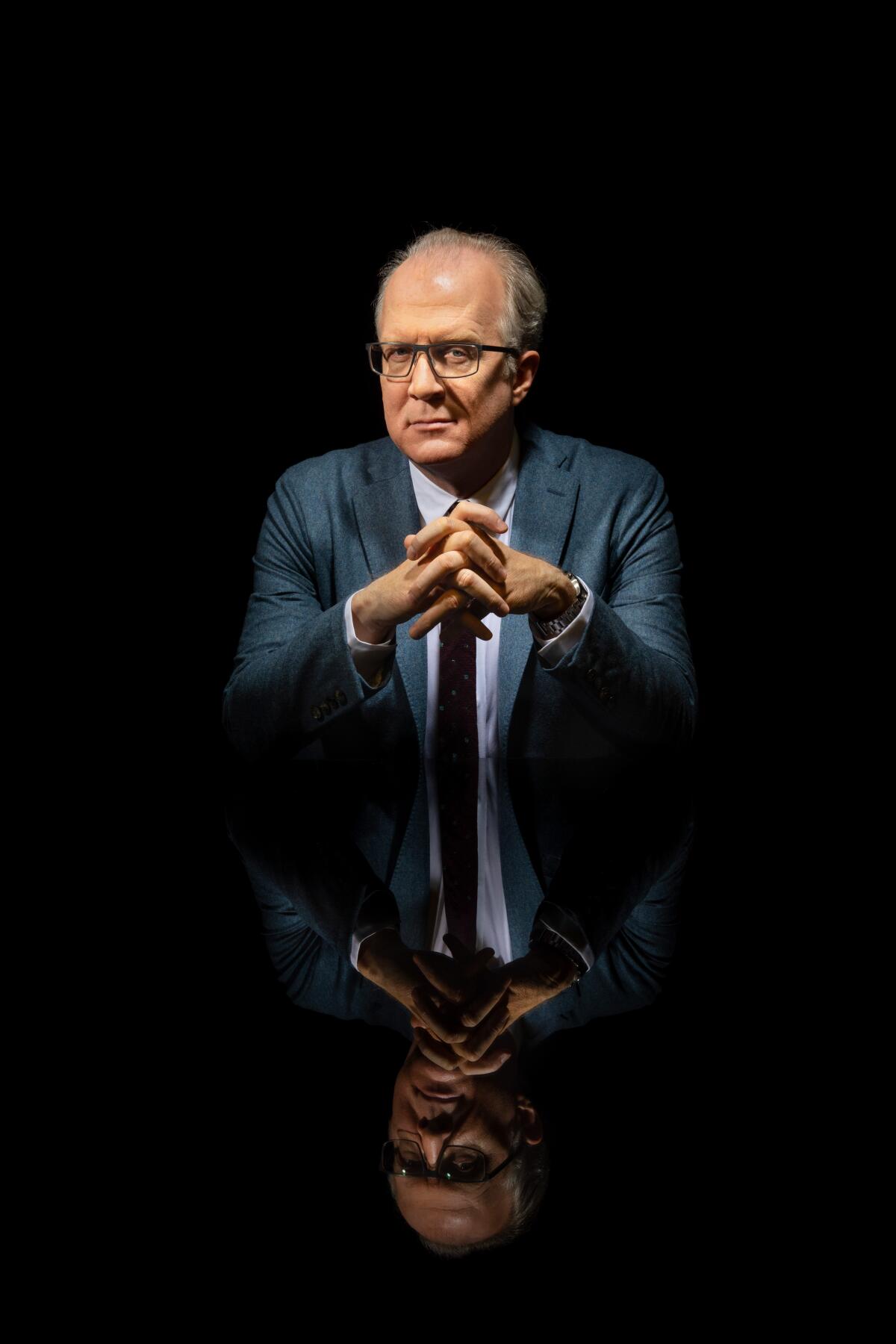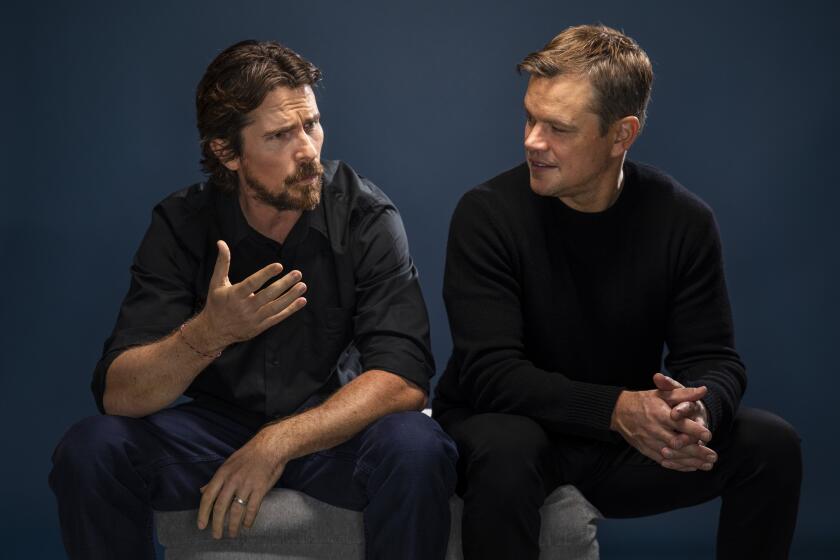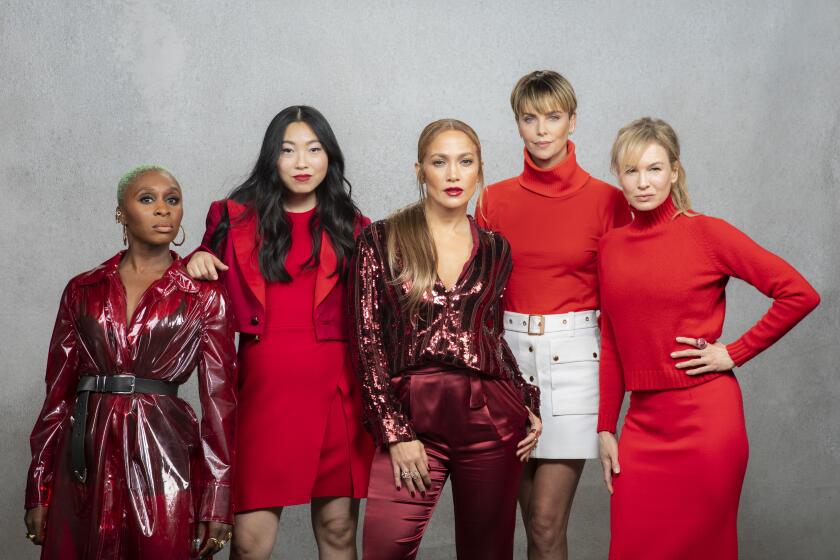That ‘Ford v Ferrari’ scene with the exec crying in the race car? That was (mostly) real

- Share via
The talk in Hollywood is that when casting a bristling, impenetrable supporting part that requires something extra, Tracy Letts is your guy. “I get asked to do them a lot,” says Letts, loosening his tie while sitting in a Beverly Hills hotel suite.
“So the role has to be unique in some way. If it’s a well-written script where they just need a guy to order a drone strike? I think, ‘Done that. Don’t need to do it again.’ ” But when James Mangold sent Letts the script for “Ford v Ferrari,” and an offer to play Ford CEO Henry Ford II, he couldn’t resist. The film dramatizes Ford’s 1966 hiring of car designer Carroll Shelby (Matt Damon) and racing driver Ken Miles (Christian Bale) to build a vehicle fast enough to compete against Enzo Ferrari at Le Mans.
Matt Damon and Christian Bale have made their share of blockbusters, but with “Ford v Ferrari,” they place their bets on an endangered Hollywood species: the adult drama.
Early next year, Letts — who won the Pulitzer Prize for drama for his play “August: Osage County” and a Tony Award for his portrayal of George in the revival of “Who’s Afraid of Virginia Woolf?” — will be taking his new play, “The Minutes,” to Broadway. On this day, before settling in to talk about “Ford v Ferrari,” Letts’ sweetest side was on full display. “Bye, bye, Daddy,” said his 18-month-old son as he toddled out of the room with Letts’ wife, actress Carrie Coon (“The Leftovers”).
What was the draw in Henry Ford II?
There were a couple of reasons that he decided to go to Le Mans, but one of them was that Ferrari hurt Ford’s feelings. Here he was this titan of industry. He’s named Henry Ford II. He’s known as the Deuce. He’s a grandson of the founder. But his company is very large and in some ways a little square, and he’s trying to keep them on top. I found his insecurity really interesting. Also [James Mangold] said he really wanted to work with me — and I’m not immune to feeling flattered by that.
Is it true that you didn’t do much research?
I’m not a big research guy. I watched some YouTube videos and a documentary the Ford Motor Co. commissioned of Le Mans ’66. But it’s not a documentary. We didn’t feel the need to approximate what he looked like or sounded like.
What’s the trick to playing a scotch-sipping, suit-wearing power-wielder?
They’re sort of all variations on my dad. My dad was a man of roughly that generation, and he was a strong guy, a strong presence. Soft-spoken, but kind of powerful in his own way. Stillness can be very effective. I’ve played enough of those guys to know that that’s better than a lot of histrionics.
Talk about an amazing moment in the film: Shelby gives Henry Ford II a spin in a speeding race car.
The movie is analog. We’re not up there shooting up with tennis balls against a green screen. Everything’s real. So in that scene I’m actually in a car with Matt, and we’re actually going at very fast speeds. Matt isn’t actually driving, we’re being pulled by this camera car, but it got up to 100 mph and spun us around. All that was to allow for real adrenaline to be in the scene.
“Little Women” is your second time being directed by Greta Gerwig.
I’d do anything for Greta. Carry cable. Anything.
How did you two originally meet?
We were both in Todd Solondz’s movie “Weiner-Dog,” but we didn’t work together. So we met at Sundance. The after-party was so loud. It was just terrible. But Greta and I chatted for 20, 25 minutes. She told me later, “That’s when I realized you’re not a hard-ass — you’re an old softie.” Then she started thinking of me as the father in “Lady Bird.” I just leapt at that. The script was so great, and it was, like, “Oh, I can just dress like a person, read a newspaper and eat a piece of toast.” That was very attractive to me.
What did Jennifer Lopez, Charlize Theron, Renée Zellweger, Awkwafina and Cynthia Erivo talk about when they got together for a conversation?
Then we became friends. She sent me the script for “Little Women” as if she wanted my notes. But the truth is that she’d written a ... great screenplay. I had no notes. It was, like, “You’re a master at this.” Then she offered me a role [as the Marches’ next-door neighbor, Mr. Dashwood].
Has anyone mentioned to you that there’s a scene in “Ford v Ferrari” where your reaction recalls President Trump’s arc of emotions while being booed at the World Series?
No, but I do think there’s something. Trump, in a sense, is kind of a throwback to these white [jerks] who ran the world for such a long time and we’re really tired of. We’ve seen a lot of the damage they’ve done over time. I don’t know that Henry Ford II falls in that category. He’s certainly a more benign figure than Donald Trump, but you can understand why that’s in the public consciousness these days.
More to Read
Only good movies
Get the Indie Focus newsletter, Mark Olsen's weekly guide to the world of cinema.
You may occasionally receive promotional content from the Los Angeles Times.












